21 Entry-level Engineering Degree Jobs + Salary Rates
Team Prosple
So you just graduated with your engineering degree. That is great news. We understand how you might have questions about what comes next. What kind of engineering degree jobs are out there? How much can I expect to earn? This is a big decision, and it is normal to have questions.
Our guide is here to help you with clear and detailed answers. We will show you 21 jobs that are perfect for recent engineering graduates like you and give you salary ranges so you are prepared when you negotiate your first engineering position.
21 High-demand engineering degree jobs you can pursue right after graduation
Let’s break down the different engineering jobs to understand each one better. As you review this list, pay attention to the ones that resonate with you.
1. Engineering technician
You will assist experienced engineers and provide technical support as an engineering technician. You could be in a workshop, on a construction site, or in an office environment. Your day-to-day will include:
- Calibrate and maintain laboratory equipment.
- Prepare technical reports to document findings.
- Troubleshoot technical problems and assist with solutions.
- Conduct tests and collect data on equipment or materials.
- Draft technical drawings and schematics based on engineer instructions.
Requirements
- Knowledge of drafting software like AutoCAD, SolidWorks or similar
- Familiarity with electronic components like resistors, capacitors, transistors
- Knowledge of laboratory equipment calibration procedures
- Ability to write clear and concise reports documenting findings
Average annual salary
2. Manufacturing engineer
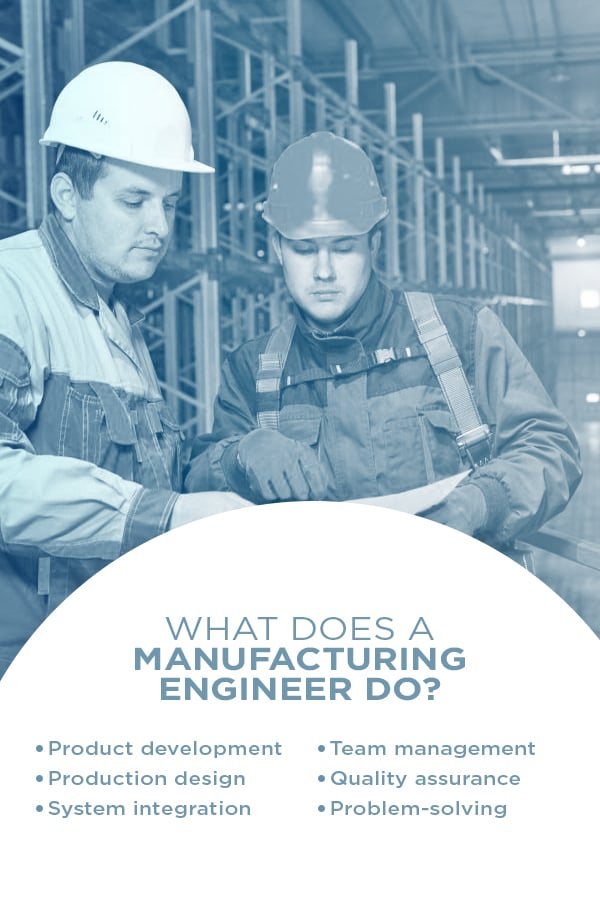
Manufacturing engineers focus on optimising the production process in factories and workshops. You will work closely with production teams to ensure efficiency and quality. Your tasks include:
- Troubleshoot production issues and develop solutions.
- Design and implement new production methods or layouts.
- Analyse production processes to identify areas for improvement.
- Select and specify machinery and equipment for production lines.
- Monitor production quality and ensure adherence to specifications.
Requirements
- Production process analysis using techniques like flowcharts and value stream mapping
- Knowledge of different production methods (e.g., machining, casting)
- Familiarity with production planning and scheduling software (e.g., MRP)
- Understanding of statistical process control (SPC)
- Knowledge of safety regulations like Safe Work Australia standards
Average annual salary
- $90,000
3. Quality control engineer
As a quality control engineer, you will ensure everything meets the required standards in manufacturing or construction projects. You could be working in factories, building sites, or labs. Your duties will be:
- Conduct tests based on quality control procedures.
- Maintain quality control documentation and records.
- Analyse test data and identify potential quality issues.
- Inspect products, materials, and equipment for defects or non-compliance.
- Report quality issues and recommend corrective actions to engineers and supervisors.
Requirements
- Familiarity with quality control standards like ASME, ASTM, ISO
- Know how to use callipers, gauges, and other measuring tools
- Understanding of common Non-destructive testing (NDT) methods (e.g., ultrasonic testing)
- Analysing inspection data to identify trends and non-conformances
- Maintaining accurate records of inspections and test results
Average annual salary
- $90,000
4. Field engineer
Field engineers are the on-site problem solvers. You will travel to client locations to install, commission, troubleshoot, and maintain technical equipment. Expect to work in different environments – from construction sites to power plants. Your tasks will include:
- Oversee the installation of equipment according to engineering plans.
- Perform commissioning tests to ensure equipment functions correctly.
- Troubleshoot technical problems with installed equipment.
- Provide technical support and train clients on equipment operation.
- Prepare service reports and document field activities.
Requirements
- Troubleshooting skills with a methodical approach to diagnosing and resolving technical problems
- Ability to explain complex technical concepts to clients in a clear and concise way
- Provide excellent technical support and build rapport with clients
- Familiarity with technical manuals and schematics
- Understanding of safety hazards specific to the field environment
Average annual salary
- $85,750
5. Design engineer
As a design engineer, you will be the creative mind behind new products and systems. You will use engineering principles and software to turn ideas into real products. Your workplace could be in a design studio, an office, or even virtually. Expect tasks like:
- Collaborate with other engineers to refine and finalise designs.
- Work on new product concepts based on project requirements.
- Create detailed engineering drawings and 3D models using CAD software.
- Select appropriate materials and components based on design specifications.
- Perform engineering calculations to ensure designs meet functional and safety standards.
Requirements
- Proficient in 3D modelling software like SolidWorks, CATIA, or similar tools
- Understanding of statics, dynamics, and strength of materials
- Basic understanding of computer-aided engineering (CAE) tools like FEA (finite element analysis) software
- Knowledge of Design for manufacturability (DFM) and how design choices impact production processes
- Knowledge of relevant engineering standards like ANSI ASME standards, depending on the industry
Average annual salary
- $84,000
6. Validation engineer
Validation engineers ensure new products and systems function as intended. You will develop and execute test plans to verify if designs meet specific requirements and regulations. Your work could take place in labs, manufacturing facilities, or even on-site with prototypes. Your tasks will include:
- Develop test plans based on design specifications and regulatory standards.
- Select and set up appropriate testing equipment.
- Conduct tests to evaluate the functionality, performance, and safety of the product or system.
- Analyse test data and identify any deviations from expected results.
- Document test results and report any identified issues to relevant engineers.
Requirements
- Understanding of relevant testing standards (e.g., UL, IEC)
- Familiarity with various testing equipment used in the specific industry
- Know how to use software to collect and analyse test data
- Ability to create comprehensive test plans based on design specifications
- Technical report writing skills to document test results and present findings clearly
Average annual salary
- $95,500
7. Application engineer
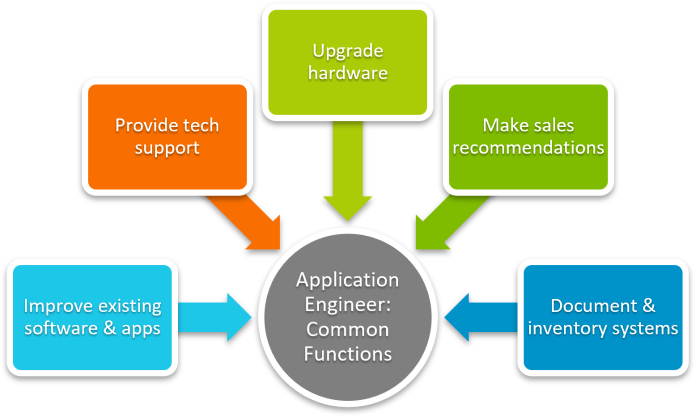
As an application engineer, you will bridge a company's technology and its customers. You will help businesses understand and use the company's products or software to solve their specific problems. Your day-to-day will include:
- Analyse customer needs and challenges to identify how the company's product can be a solution.
- Develop custom solutions or configurations to meet specific customer requirements.
- Provide technical support and training to customers on how to use the product effectively.
- Troubleshoot technical issues customers face with the product.
- Collect feedback from customers and suggest product improvements to the engineering team.
Requirements
- Ability to explain technical concepts to customers with varying levels of technical expertise
- In-depth understanding of the company's products and their capabilities
- Providing technical assistance to customers and troubleshooting issues
- Training and presentation skills to deliver effective product training sessions for customers
Average annual salary
- $98,000
8. Robotics engineer
The world of robotics is booming, and robotics engineers are the masterminds behind these machines. You will design, develop, program, and test robots for various applications. Your workplace could be a research lab, a manufacturing facility, or a robotics company's headquarters. Expect responsibilities like:
- Design robots for specific tasks, considering factors like movement, manipulation, and sensors.
- Develop control systems and program robots to perform complex actions autonomously.
- Integrate sensors and software to let robots perceive their environment and interact with objects.
- Test and calibrate robots to ensure they function safely and accurately.
- Troubleshoot and maintain robots to keep them operating at optimal performance.
Requirements
- Proficiency in Python, C++, or robot-specific programming languages
- Understanding of robot kinematics, dynamics, and control systems
- Knowledge of different types of sensors and actuators used in robotics
- Familiarity with robot simulation software (e.g., Gazebo, V-REP)
- Basic understanding of electronics and electrical circuits
Average annual salary
9. Automation engineer
As an automation engineer, you will be the efficiency expert. You will design and implement automated systems to streamline factory, workshop, or even laboratory processes. Your everyday tasks will be:
- Write code to control the movements and actions of robots and PLCs.
- Develop the logic and sequence of operations for the automated system.
- Combine mechanical components, sensors, and software to create a cohesive automated system.
- Thoroughly test the automated systems to identify and fix any issues.
- Perform regular maintenance on the system and create clear documentation.
Requirements
- Understanding of programmable logic controllers (PLCs) and industrial automation principles
- Knowledge of robot programming and integration if the role involves robotic automation
- Familiarity with Supervisory Control and Data Acquisition (SCADA) systems used in industrial automation
- Understanding of common industrial communication protocols (e.g., Modbus, Profibus)
- Basic troubleshooting skills for electrical and mechanical systems
Average annual salary
- $103,000
10. Biomedical engineer
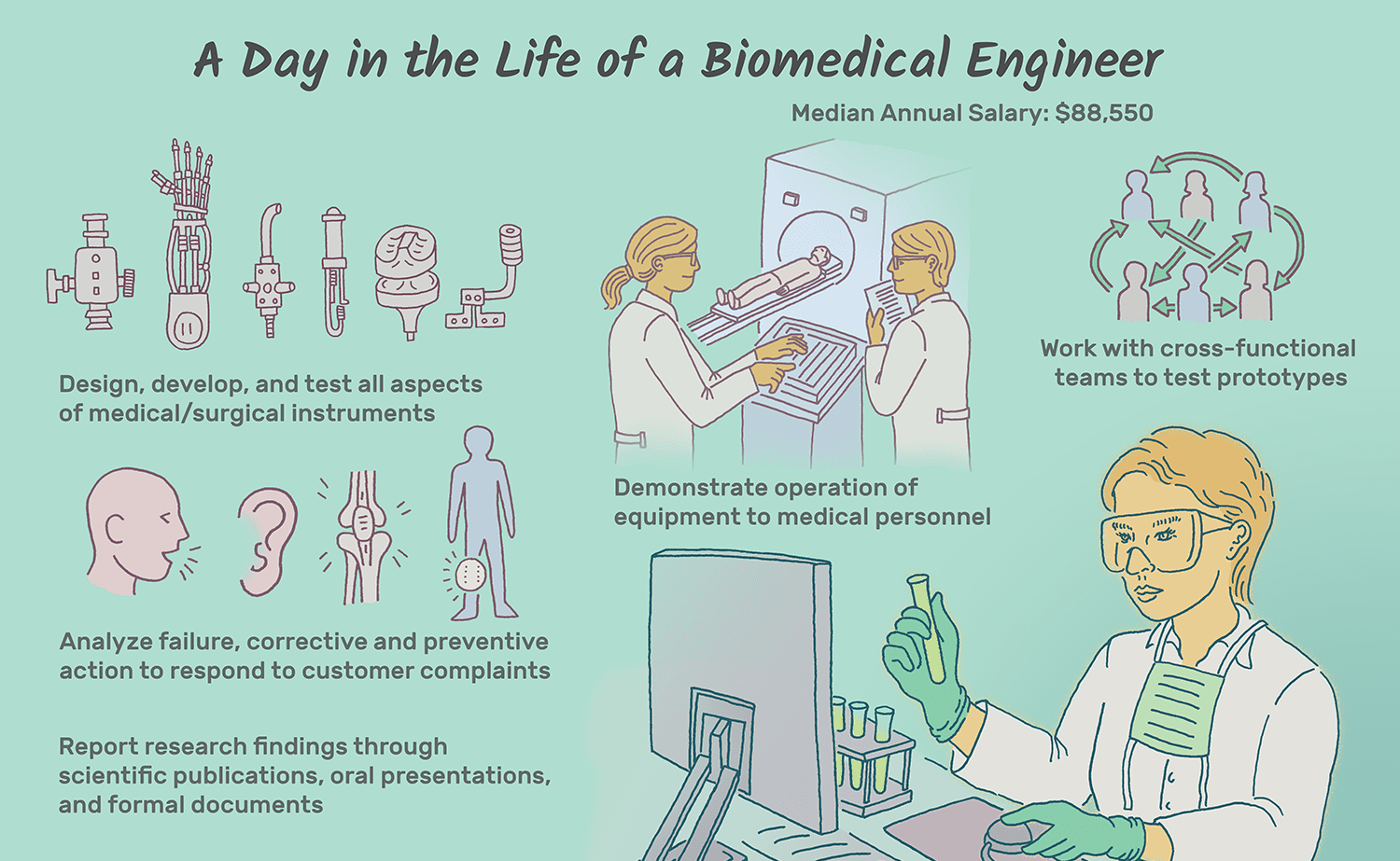
Biomedical engineers combine engineering principles with medical science to develop innovative healthcare solutions. You could work on prosthetics, medical devices, imaging equipment, or artificial organs. Job responsibilities include:
- Research and analyse medical problems and needs to identify opportunities.
- Assist in designing new medical devices or implants. You will consider factors like functionality, patient safety, and regulatory compliance.
- Test and evaluate medical devices to ensure they function safely and effectively.
- Analyse data from device testing to identify and resolve any performance or safety concerns.
- Collaborate with doctors and therapists to ensure designs meet clinical needs.
Requirements
- Understanding of how engineering principles apply to biological systems
- Knowledge of human anatomy and physiological systems
- Familiarity with FDA regulations for medical devices
- Understanding of the properties and applications of biocompatible materials
- Ability to analyse complex biological data sets
Average annual salary
- $86,560
11. Mechanical engineer
Mechanical engineers design and develop all sorts of mechanical systems and devices. You could work on anything from car engines to robots to air conditioning units. Here’s what you can expect to do with a mechanical engineering degree:
- Design and create detailed technical drawings of mechanical components using CAD software.
- Perform calculations to analyse mechanical systems' strength, movement, and efficiency.
- Select the right materials for components based on factors like strength and weight.
- Work with prototypes and conduct tests to refine the design and ensure functionality.
- Troubleshoot and resolve technical issues with existing mechanical systems.
Requirements
- Understanding of stress, strain, and material behaviour
- Knowledge of fundamental thermodynamic principles
- Ability to design and analyse mechanical components and systems
- Knowledge of computer-aided engineering (CAE) tools and proficiency in FEA (finite element analysis) software
Average annual salary
- $102,000
12. Civil engineer
Civil engineers design and oversee the construction of infrastructure projects. This could be everything from buildings and bridges to roads and water treatment plants. You will spend your days working on construction sites or meeting clients. In a civil engineering role, expect tasks like:
- Analyse site conditions and plan civil engineering projects.
- Design and calculate the structural integrity of different structures.
- Create construction plans and specifications for civil engineering projects.
- Work with contractors and oversee construction activities to ensure quality and safety.
- Inspect completed structures and infrastructure to see if they meet design specifications.
Requirements
- Understanding of structural mechanics and how to analyse loads on structures
- Knowledge of surveying principles and equipment
- Understanding of the properties and applications of construction materials (e.g., concrete, steel)
- Familiarity with relevant building codes and safety standards
- Proficiency in software for structural analysis and design
Average annual salary
- $90,500
13. Electrical engineer
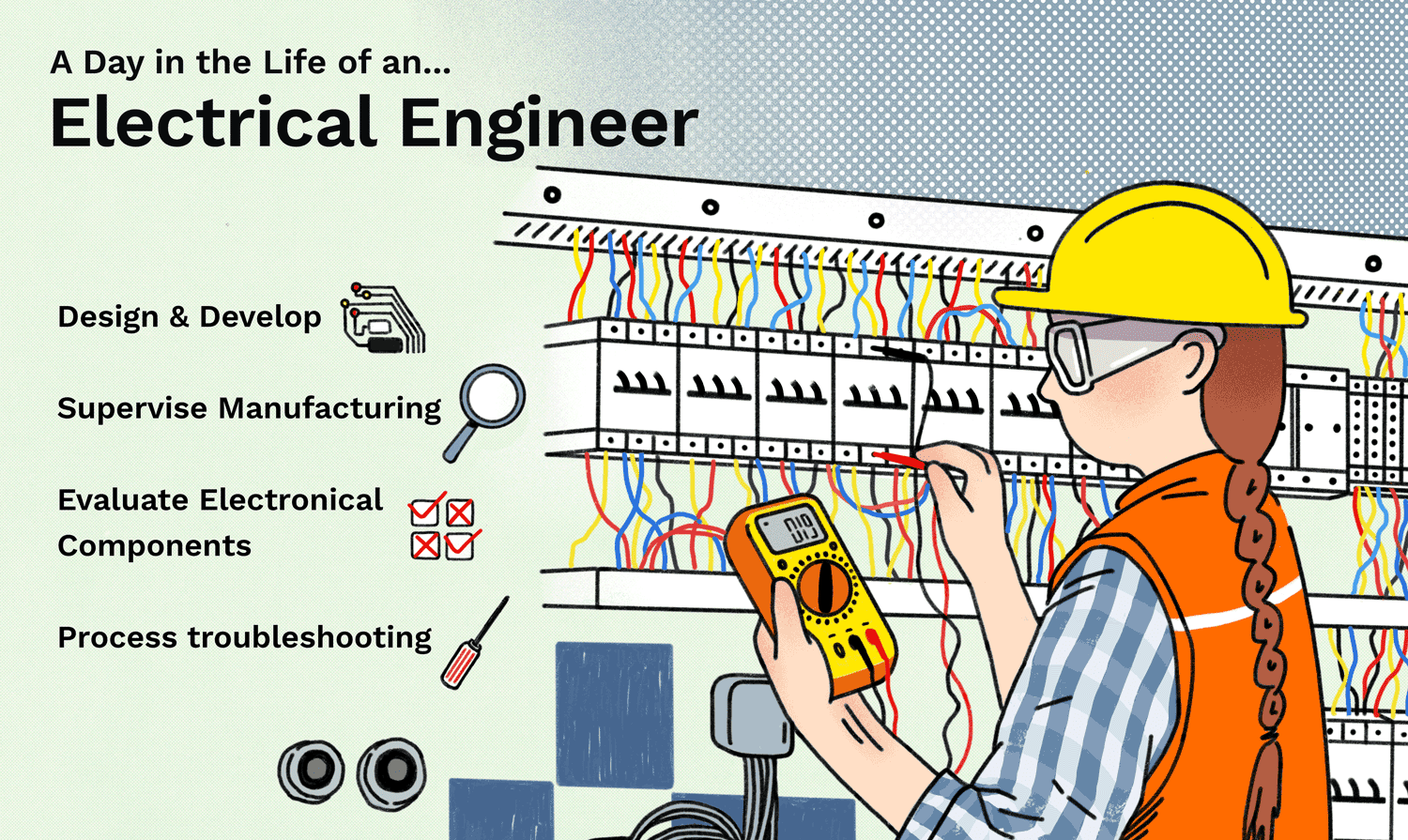
You will deal with everything that powers our world in an electrical engineering job. This could be anything from power grids and circuits to electric motors and consumer electronics. You could work in offices, power plants, or tech companies. Your day-to-day will include:
- Design electrical circuits and systems while considering factors like power consumption and safety.
- Select appropriate electrical components like motors, transformers, and control systems.
- Analyse the performance and efficiency of electrical circuits.
- Develop and test prototypes of electrical equipment to ensure functionality.
- Collaborate with other engineers to integrate electrical systems with other components.
Requirements
- Understanding of electrical circuits, including AC/DC circuits, power analysis, and electronics
- Knowledge of digital circuits and logic gates
- Understanding of electromagnetic principles and applications
- Knowledge of power generation, transmission, and distribution systems
Average annual salary
- $105,000
14. Chemical engineer
Chemical engineering careers involve designing and developing processes to transform raw materials into valuable products. You will use your chemistry and engineering principles knowledge to design and develop chemical processes. Your tasks include:
- Develop and analyse chemical reaction processes.
- Design and select equipment for chemical plants.
- Create detailed flowcharts and perform calculations to optimise production processes.
- Monitor and control plant operations to ensure product quality.
- Ensure processes are designed and operated with safety as a top priority.
Requirements
- Understanding of chemical kinetics, thermodynamics, and reactor design
- Ability to model and simulate chemical processes
- Knowledge of feedback control systems for process optimisation
- Understanding of safety hazards in chemical plants and risk mitigation strategies
- Proficiency in software for process simulation and design
Average annual salary
- $87,000
15. Environmental engineer
As an environmental engineer, you will tackle real-world problems like pollution and waste management. You will work with companies and government agencies to design solutions that minimise environmental impact. Your major duties will be:
- Collect samples of air, water, or soil to assess pollution levels.
- Interpret the data to pinpoint environmental concerns.
- Develop plans to reduce pollution or manage waste effectively.
- Monitor projects to ensure solutions are followed correctly.
- Advise companies on permits and waste management practices to comply with environmental regulations.
Requirements
- Familiarity with environmental laws and regulations
- Understanding of sustainable design and practices
- Knowledge of different treatment methods for water and wastewater
- Proficiency in Geographic Information Systems (GIS) software for environmental data analysis
Average annual salary
- $86,000
16. Software engineer
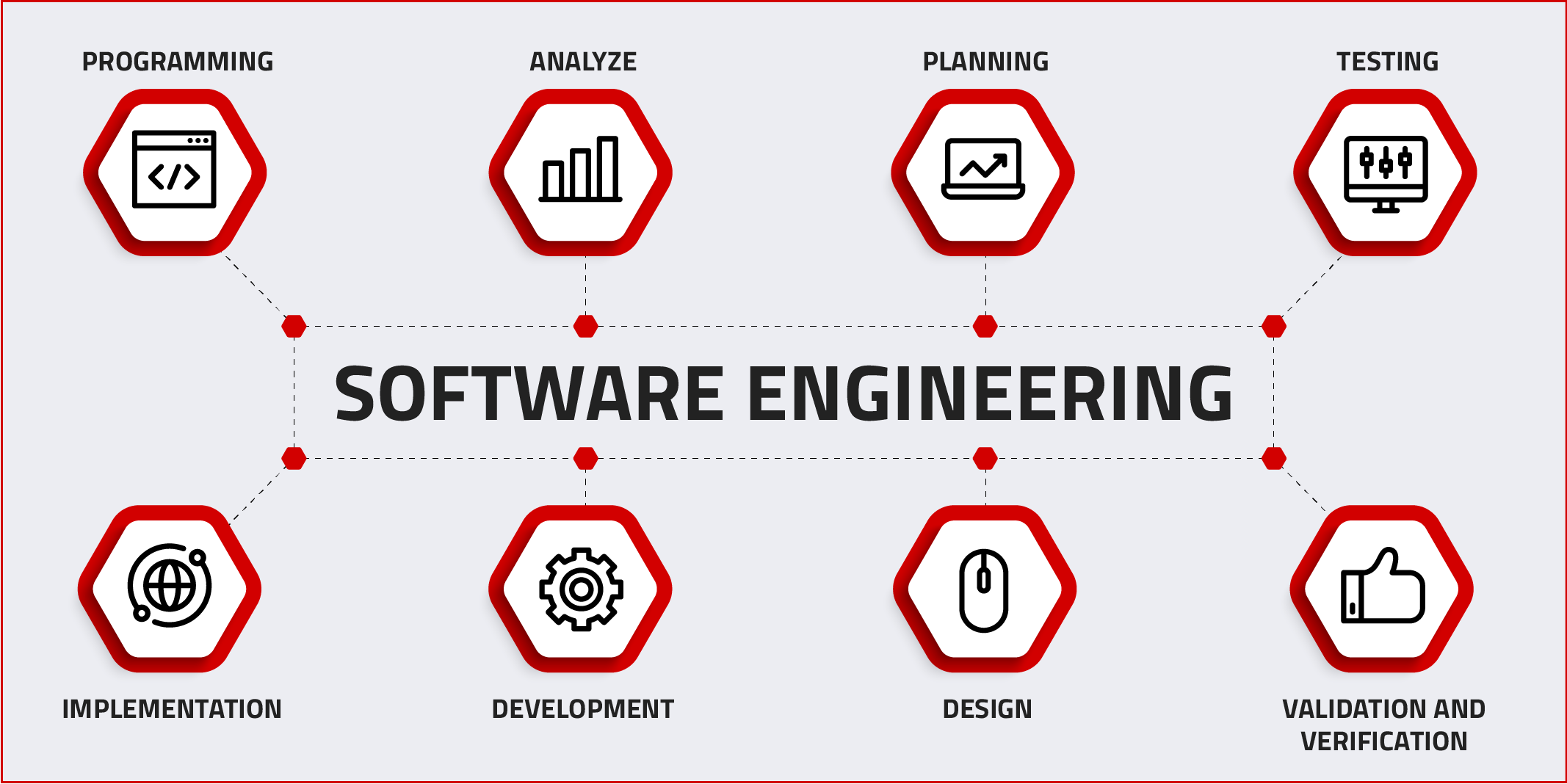
As a software engineer, you will build apps and websites people use every day. You will collaborate with designers and testers to create user-friendly and efficient software. Here's a glimpse of what you will be doing:
- Break down complex software features and create a blueprint for the code.
- Write clean and efficient code according to software requirements.
- Test and debug software to identify and fix errors.
- Collaborate with designers and other engineers to develop software features.
- Keep existing software running smoothly by fixing bugs and adding new features.
Requirements
- Proficiency in at least one high-level programming language (e.g., Java, Python)
- Understanding of Agile or Waterfall development methodologies
- Knowledge of fundamental data structures and algorithms
- Familiarity with using and developing APIs
- Proficiency in using Git or a similar version control system
Average annual salary
- $119,000
17. Safety engineer
As a safety engineer, your focus is keeping people safe in workplaces. You will work with companies in various industries to identify and reduce safety hazards. You will inspect workplaces and analyse the risks of accidents and injuries. Here’s what you will be doing:
- Inspect workplaces to identify potential hazards like faulty equipment or unsafe work practices.
- Analyse the severity and likelihood of each hazard to prioritise solutions.
- Create clear procedures and guidelines to minimise risks.
- Analyse accidents and near misses to prevent similar incidents in the future.
- Train employees on safe work practices and emergency protocols.
Requirements
- In-depth knowledge of Safe Work Australia standards and regulations
- Understanding of different risk assessment methods (e.g., FMEA)
- Ability to investigate workplace accidents and identify root causes
- Effectively delivering safety training to employees and communicating safety procedures
- Knowledge of workplace hazards related to air quality, noise, and ergonomics
Average annual salary
18. Industrial engineer
Industrial engineers are problem-solvers who optimise processes in manufacturing and production. You will design better layouts, reduce waste, or make things smoother. Here's what you will do daily:
- Map out production lines to improve workflow and reduce bottlenecks.
- Develop plans to reduce production costs and improve quality.
- Design ergonomic workstations to prevent worker fatigue and injuries.
- Implement new technologies like automation or lean manufacturing principles.
- Analyse data to identify areas for improvement and recommend solutions.
Requirements
- Understanding of statistical analysis and probability concepts
- Knowledge of linear programming, queuing theory, and other optimisation methods
- Understanding of lean manufacturing concepts
Average annual salary
- $94,000
19. Aerospace engineer
In an entry-level aerospace engineering role, you will work on the design, development, and testing of aircraft and spacecraft. You will apply principles of physics and mathematics to solve engineering problems. Here are the tasks you will handle:
- Draft technical drawings and specifications for aircraft components.
- Perform stress and weight analysis of aircraft structures.
- Create computer models to simulate aircraft performance and test designs.
- Assist with testing prototypes of aircraft components or systems.
- Perform wind tunnel testing or analyse data from flight tests.
Requirements
- Understanding of fluid mechanics principles applied to flight vehicles
- Knowledge of different aircraft and spacecraft propulsion systems (e.g., jet engines, rocket engines)
- Understanding of the forces and motions affecting aircraft and spacecraft flight
- Knowledge of feedback control systems for aircraft and spacecraft stabilisation
- Proficiency in advanced CFD (computational fluid dynamics) software for aerospace applications
Average annual salary
- $111,431
20. Petroleum engineer
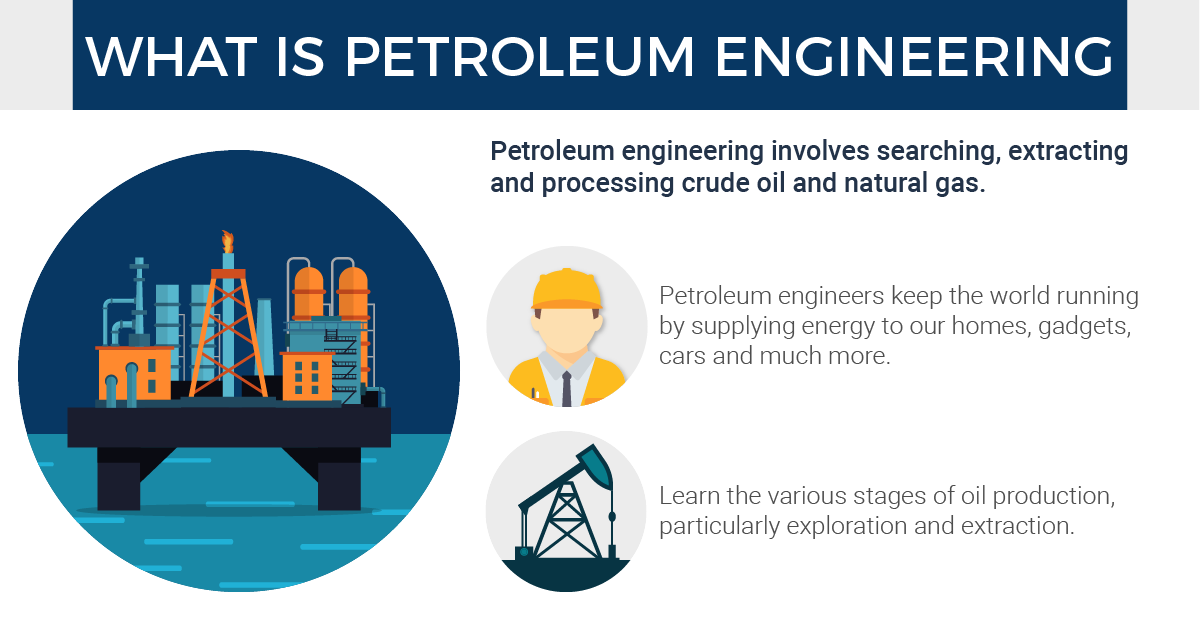
In this role, you will work on the extraction and production of oil and gas. You will use engineering principles to develop methods for drilling and producing hydrocarbons. Here’s what you will do in this role:
- Analyse seismic surveys and well logs to locate potential oil and gas reserves.
- Develop plans for drilling wells to safely and efficiently extract oil and gas.
- Assist in estimating costs for drilling and production projects.
- Track oil and gas flow from wells and make adjustments to increase production.
- Ensure drilling and production activities comply with safety and environmental standards.
Requirements
- Understanding of oil and gas reservoir properties and behaviour
- Knowledge of drilling techniques and wellbore completion methods
- Understanding of techniques for optimising oil and gas production
- Proficiency in software for modelling oil and gas reservoir behaviour
Average annual salary
- $141,000
21. Materials engineer
As a materials engineer, you will develop and improve materials used in different products. This could mean working on metals, ceramics, polymers, or composites. Your tasks will include:
- Conduct tests to measure the properties of materials.
- Analyse test data to understand how materials behave under different conditions.
- Research and develop new materials with specific properties.
- Recommend the best materials based on their design and function.
- Troubleshoot material failures and recommend solutions.
Requirements
- Understanding of the structure, properties, and behaviour of different materials
- Knowledge of various techniques used to analyse material properties (e.g., microscopy, spectroscopy)
- In-depth knowledge of metals and their alloys if specialising in metallic materials
- Understanding of polymer properties and processing if specialising in polymeric materials
Average annual salary
- $96,750
Find your dream job with Prosple: Here's how

Prosple is designed to help you get a head start on your career. It is your one-stop shop for finding internships and graduate jobs. Unlike general job boards, we cater specifically to students and recent graduates. The best part is we have a huge database of entry-level opportunities across different fields.
Let’s see why you should opt for Prosple:
- Prosple has a user-friendly dashboard. This means you can find everything you need quickly and easily.
- Get notified and alerted about new jobs that match your profile. This way, you can be among the first to apply for the best opportunities.
- The Day in the Life series lets you see a typical day for different graduate jobs. This helps you visualise your future career and make informed decisions.
- Finding your dream job shouldn't cost you a fortune. That is why Prosple is completely free to use. Sign up, search for jobs, and apply without breaking the bank.
- Prosple uses advanced matching algorithms to connect you with jobs that fit you well. Our platform does the hard work of finding relevant opportunities.
- At Prosple, we have a vast library of resources to help with your job search, from resume tips to interview prep. Get all the tools you need to succeed in one place.
- With advanced search filters, you can narrow your job search to exactly what you seek. Save time by only seeing jobs that match your skills and interests.
- The Work Rights feature tailors job recommendations to your work authorisation. This means you will only see opportunities you are eligible for, saving you time and frustration.
- Prosple works with top employers to bring you verified and authentic job listings. You can be confident that the opportunities you see are real and from reputable companies.
Conclusion
We gave you a glimpse into the most exciting engineering degree jobs. But remember, it is just the start. Engineering careers are one of the most rewarding. The earlier you step in, the sooner you can start building a fulfilling career. Don't let the initial learning curve get you down. Learn from your mistakes and keep growing.
Now that you are fired up about your future find your dream engineering role fast with Prosple. With a focus on recent graduates and an easy application process, you can quickly get your foot in the door at the company of your dreams. Sign up for free and get matched with exciting opportunities in your field.